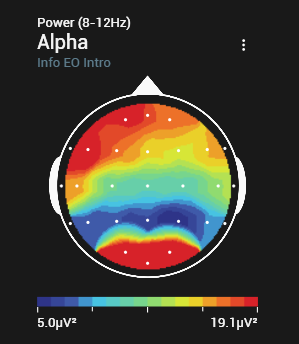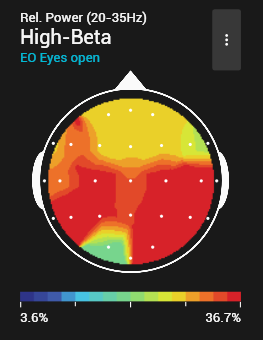"Lost in My Own Life": A Neurofeedback Journey to Reconnection and Joy
- Catalina Sparleanu
- Mar 16, 2025
- 5 min read

Sophia had everything one might think necessary for a happy life - a loving husband, two wonderful children, a career as a senior executive, and good physical health. Yet, beneath the surface, she felt trapped in an unshakable cycle of low mood and despair, as if she were living life on autopilot, disconnected from any real sense of joy. Each morning, she would wake up feeling drained before the day even began. It wasn’t just exhaustion, it was an overwhelming sense that no matter what she did, nothing would ever truly feel fulfilling.
She would go through the motions, but deep down, she felt like she was simply existing rather than truly living.
After identifying the reasons for her struggles, Sophia embarked on a journey of brain training and personal growth. The results were life-changing: the heavy fog that had clouded her mind for years finally lifted, allowing her to reconnect with joy in everyday moments and approach life's challenges with newfound clarity and composure.
The Challenge
She couldn't explain why she felt this way. Rationally, she knew she was fortunate, but emotionally, she felt disconnected, as if her mind was working against her. More than anything, she just wanted to be left alone. The thought of facing another day, another conversation, another expectation felt unbearable.
"Every day, I’d ask myself, ‘What’s the point?’ I knew what I should be doing - getting up, working, taking care of my family - but I just couldn’t find the energy or the drive. Even the smallest tasks felt monumental, like pushing a boulder uphill with no end in sight. I wasn’t sad in the traditional sense, but I wasn’t happy either. It was as if I had lost the ability to feel excited or interested in anything. I was there, but not really present, moving through life as if watching someone else live it."
She longed to curl up under a blanket, shut the world out, and let the days pass by without having to engage in them. Even moments that should have brought comfort - sitting with her family, meeting friends, spending time in nature - felt distant, like echoes of a life she could no longer reach.
The Neurofeedback Assessment
The results of the neurofeedback assessment were eye-opening. Her brain map revealed an imbalance in frontal alpha waves, contributing to her persistent low mood and difficulty in experiencing joy. Additionally, she had excessively high high beta activity in her parietal regions, correlating with excessive worry, rumination, and an inability to shut off anxious thoughts.
Understanding these patterns provided her with relief. There was a physiological explanation for her struggles. More importantly, it meant there was something she could do to address it.
The Mental Training Journey
Sophia embarked on a structured neurofeedback program designed to train her brain toward a healthier, more balanced state. The sessions involved real-time feedback, helping her brain learn to regulate its own activity and shift away from the patterns that kept her locked in negativity.
To complement neurofeedback, she also engaged in cognitive-behavioral therapy (CBT), which helped her recognize and reframe the automatic negative thoughts that had become her default perspective. Cognitive restructuring exercises enabled her to challenge long-held beliefs that fueled her despair, while hypnosis sessions helped her experience and practice positive mental states and deep relaxation.
At first, she felt subtle shifts - her mornings didn’t feel quite as heavy, and she found herself responding differently to stress. Then, around the seventh week, she caught herself laughing, genuinely laughing, at a joke her husband made. It was a simple moment, but for Sophia, it was profound. It was the first time in years that joy felt effortless.
The Results
The Frontal Alpha Asymmetry Score is a metric used in neurofeedback to measure the difference in Alpha brainwave activity (8-12 Hz) between the right and left frontal lobes. This metric is a valuable indicator of emotional processing and mood states. Higher scores suggest a more positive emotional state and approach-oriented behaviors, while lower scores are linked to negative emotions and withdrawal behaviors.
In Sophia's case, her initial assessment revealed a concerningly low score of 8, indicating significant frontal alpha imbalance that aligned with her persistent feelings of low mood and disconnection. This physiological measurement helped explain why she felt like she was "simply existing rather than truly living" despite having all the external factors for happiness.
After completing her neurofeedback program, Sophia's follow-up assessment showed a remarkable improvement, with her score rising dramatically to 76. This impressive shift to a healthy range (where scores above 1 indicate balanced frontal alpha activity) corresponded directly with the positive changes she experienced in her daily life.
Life After Neurofeedback and Mental Training
After several months of neurofeedback training combined with therapeutic interventions, Sophia found herself viewing life through a different lens. The heavy fog that had clouded her mind for years began to lift.

At work, she no longer felt paralyzed by self-doubt or irritation; instead, she approached challenges with a newfound clarity and composure. Instead of dreading interactions with colleagues, she found herself engaging more naturally, even looking for new oportunities to interact with others, like joining networking events or various clubs.
At home, her family noticed a transformation. Her children remarked that she seemed "lighter," as if an invisible weight had been lifted. She rediscovered joy in small, everyday moments, felt more energetic, and tasks didn't seem a burden anymore.
Perhaps the biggest change was in how she perceived her own thoughts. Negative thoughts still surfaced, but they no longer held the same power over her. Instead of spiraling into despair, she had the tools to recognize and shift them.
Neurofeedback Restores Joy and Purpose - It Can Help You Too
Sophia's journey was not about becoming a different person but about reclaiming the person she had always been underneath the storm of negative thoughts. Neurofeedback, combined with structured mental training approaches, gave her a path out of despair and into a life where she could finally experience joy.
For those struggling with similar battles - feeling disconnected despite having "everything", going through the motions without fulfillment, or feeling trapped in patterns of negative thinking - Sophia's story serves as a testament that change is possible. The brain has remarkable plasticity, and with the right intervention, it can learn to function in healthier, more balanced ways.
Take the first step toward reclaiming your sense of purpose and emotional balance. Schedule an introductory call to learn how neurofeedback can help you move from merely existing to truly living.
* Names and personal details have been changed to protect privacy, and the client has consented to share this data.










Comments